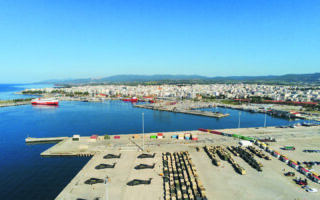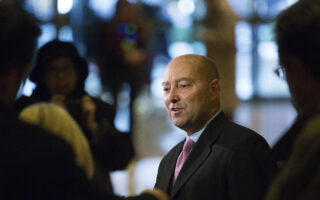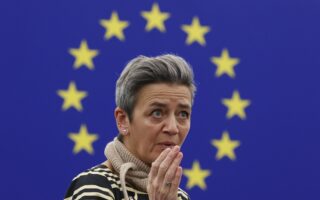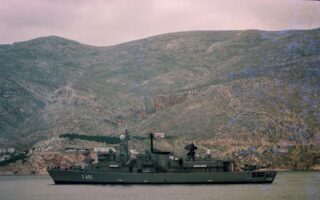Competition with China does not mean war
The veteran of American politics and architect of the Good Friday Agreement, talks about Russia, Joe Biden and Greece
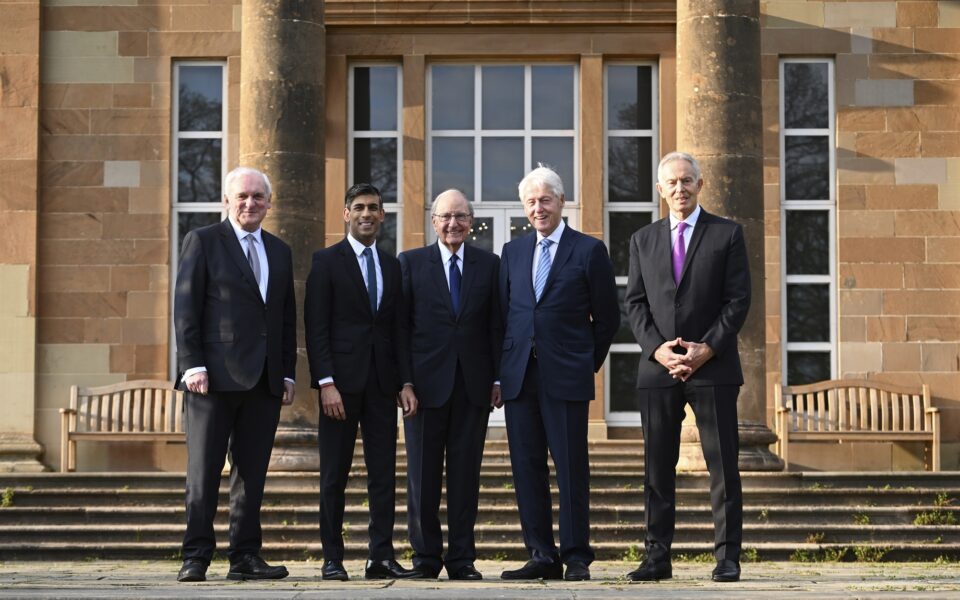
In the last week of June and on the last day of his holiday in Greece, I met George Mitchell at Costa Navarino, in the Peloponnese. The American politician, diplomat, lawyer and former Democratic senator served as the majority leader of the United States Senate from 1989 to 1995. He 89 years old today and has had leukemia for a few years.
The interview with him – the man who was instrumental in achieving the 1998 Good Friday Agreement that brought peace to Northern Ireland, where he spent five years as President Bill Clinton’s special envoy before becoming President Barack Obama’s special envoy in the Middle East – was one of the rare occasions that, although it lasted more than an hour, I found it wasn’t enough.
One of the first topics we discussed was the war in Ukraine. “I do not believe that the invasion by Russia was justified,” says Mitchell. “I think it was a very unwise decision by President Putin that will have long-term effects and long-term adverse effects upon Russia.”
First, Vladimir Putin’s goal, “as he himself has stated,” was to weaken NATO and the alliance of Western democracies. “And it’s had just the opposite effect, it has strengthened NATO, the addition of Finland and Sweden has made it stronger and more unified than ever,” he says.
Second, Putin repeatedly refers to the fascist-era Nazis, “because of course Russia suffered greatly during the Second World War, as a result of aggression by Germany.” From the end of the war onward, Germany had a very small army. “And one consequence of President Putin’s unwise decision to invade Ukraine is that Germany is now going to devote more and more of its budget to defense purposes. And the last thing that Russia should want is a strong, fully armed Germany,” he explains.
No one can say how and when the war will end, he adds. “I can only hope that it results in the people of Ukraine having a right to choose their own destiny.”
As for Wagner leader Yevgeny Prigozhin’s failed coup, Mitchell sees it as possible that the infighting revealed could prove damaging to Putin’s future prospects. “One of the lessons of certainly modern history is that totalitarian societies tend to have an immediate advantage in conflict by virtue of the ability to make very quick decisions, while democracies often struggle with internal conflict, disagreements, opposition parties, and it takes longer for democracies to come to a unified national position.”
On the other hand, he continues, “history also tells us that in the long run, totalitarian societies have a deficiency in that the greater the power of the individual ruler, the less likely that ruler is to have good information.”
Russia, he notes, is not an economic or military threat to the United States. But he cannot rule out the possibility of a third world war. “It’s hard to say it’s impossible – in human affairs you never know. It’s a great concern, one which President Biden has been especially careful about not saying or doing anything that would provoke such an outcome,” he says. The consequences for Russia if it decided to use nuclear weapons would be so great that it is hard to believe that the Russians themselves would launch such an attack. “But can I say it’s impossible? Of course not.”
On the other hand, the US is in competition with China. “But I don’t think we should succumb to the mindset that being in competition inevitably means being in war,” the former senator notes. On some of the US policies toward China, Democrats and Republicans are in agreement, but there is no unanimity on its broader approach, he says.
“I think that while it’s clear that the United States and Russia and China will be competitors, certainly in our lifetimes and for the foreseeable future, it does not have to be, nor should it be, a conflict in military terms. I don’t believe war is inevitable between the United States and China, and I think responsibility lies on both sides to be taking whatever steps are necessary to make certain that it doesn’t become inevitable,” Mitchell explains.
‘History tells us… totalitarian societies have a deficiency in that the greater the power of the individual ruler, the less likely that ruler is to have good information’
“And the history of Greece is a history of conflict,” he says, adding that he is reading Mark Mazower’s book “The Greek Revolution.”
As for the upcoming US elections in 2024, he hopes for the re-election of Joe Biden, with whom he served in the Senate for many years. “I know him extremely well,” says Mitchell. “He’s a very good man. He’s got a good heart, and I think he’s done a good job in extremely difficult circumstances.”
We discuss the clashes between Turkey and Greece, the difficult history of the two countries – “very, very painful for all concerned” – and I ask him why the US has been so hesitant, even though it is closer to Greece in terms of values.
“It’s the kind of calculation that goes on all the time, particularly in democratic countries. How do you reconcile your values with what you perceive to be your national interest? And they reconcile them as best they can, usually very imperfectly,” he responds.
Migration
Perhaps the biggest challenge of the current century is the refugee crisis, Mitchell says. We discuss the tragic shipwreck in Greece last month when hundreds of migrants drowned – we are, after all, in Pylos – and the desperate movement of people to the West, which will not stop unless we do something. “There will have to be, certainly at least among Western democracies, an international reconvening – it’s difficult but I believe we are capable of solving it. The trouble is, it’s a politically explosive issue in the United States and in Europe.”
“Conflict drives out migration, and that’s been the main reason for all of human history – many of the refugees, as we’re seeing right now in Ukraine and Syria, leave because of internal conflict. So to the extent that we can pursue policies that reduce the likelihood of conflict and increase opportunity everywhere, it would have a substantial dampening effect on migration,” he says.
The second factor is climate change. “Many of the refugees, or those seeking life elsewhere, are from countries which are being most severely impacted by the consequences of climate change, particularly the increasing of the amount of desert,” he explains, mentioning, for example, farmers from Africa or the Middle East.
It is usually adverse economic conditions combined with internal strife, poor governance, and unequal distribution of benefits in the country that affect migration, he says. “Those are huge contributing factors to out migration, not just the sheer numbers. I mean, if you look at sheer numbers, the United States has 330 million people, not many Americans are trying to come and live in other countries. So it’s not just size, it’s economic circumstances, it’s political circumstances.”
When the Geneva Conventions were signed after the Second World War, which established the international law that become the law of every state that signed them, there were 2 billion people in the world. “I think that it is quite clear that the current international laws created in response to the events of the Second World War are now outdated because nobody in 1945 could have predicted that the world population would go from 2 billion to 8 billion in 75 years,” he says.
The US was created by immigration, he points out. For 15,000 years only natives lived in America. The first European settlers appeared just 500 years ago, he says. “We had open immigration for almost a hundred years after our country was created. And now it’s impossible.”
“I should tell you this story. It does involve Greece,” he says. After he became known as a senator, someone called him, saying they were namesakes – he was called George Mitchell. His father’s name was Savvas Paraskevopoulos and he was from the region of Arcadia, in the Peloponnese. At 19, he immigrated to the US, where he became a laborer. His boss couldn’t pronounce his name, so Savvas Paraskevopoulos decided to call himself Mike Mitchell. He later opened a shoeshine shop in Texas, married an immigrant from Greece, and had a son – George Mitchell. He studied in Texas, and then became one of the inventors of fracking, Mitchell says. “But, so George Mitchell, I say is the real George Mitchell, the one that history will remember, not me,” he says.
The three of the most successful businesses in American history, arguably in the world, are Apple, Google and Amazon, the former senator says. “Apple was created by Steve Jobs. His father was born in Syria. Google was created by two men, one of whom, Sergey Brin, was himself born in Russia. And Amazon was created by Jeff Bezos, whose adoptive father was from Cuba. You have to ask yourself two questions. Would the United States be a better country if they had not been admitted? The answer obviously is no. But the second important question is, what do you think the chances are that if Steve Jobs had lived his life in Syria, he would’ve created Apple? Or if Sergey Brin was in Russia, he would’ve created Google or if Jeff Bezos were in Cuba, he would’ve created Amazon?”
“I say this often. Genius knows no boundaries. The challenge of society is to create the conditions in which genius can thrive and find its full expression,” Mitchell says.

